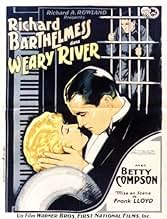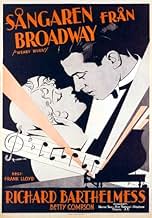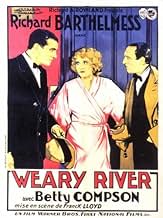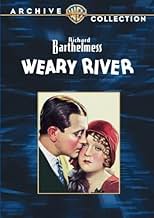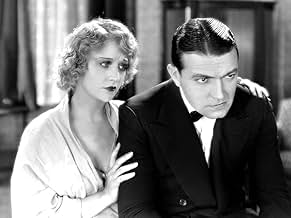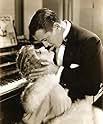Adicionar um enredo no seu idiomaA gangster is put in prison, but finds salvation through music while serving his time. Again on the outside, he finds success elusive and temptations abound.A gangster is put in prison, but finds salvation through music while serving his time. Again on the outside, he finds success elusive and temptations abound.A gangster is put in prison, but finds salvation through music while serving his time. Again on the outside, he finds success elusive and temptations abound.
- Direção
- Roteiristas
- Artistas
- Indicado a 1 Oscar
- 2 vitórias e 1 indicação no total
George E. Stone
- Blackie
- (as George Stone)
Ray Turner
- Elevator Boy
- (as Raymond Turner)
Ernie Adams
- Ex-Con in Alley
- (não creditado)
Brooks Benedict
- Jerry's Guest
- (não creditado)
Ruth Cherrington
- Actress Backstage Who Locks Her Door
- (não creditado)
James Conaty
- Attorney at Trial
- (não creditado)
Richard Cramer
- Prison Radio Announcer
- (não creditado)
Oliver Cross
- Restaurant Patron
- (não creditado)
Edwards Davis
- Prison Chaplain
- (não creditado)
Sally Eilers
- Hatcheck Girl
- (não creditado)
Jim Farley
- Plainclothesman with Sergeant
- (não creditado)
Sherry Hall
- Prison Phone Operator
- (não creditado)
Chuck Hamilton
- Prison Photographer
- (não creditado)
Avaliações em destaque
"Weary River" is what you might call a transitional style movie from Warner Brothers/Vitaphone. While it's not truly a full talking picture since much of it is silent and uses intertitles, some of it is sound--a bit of the dialog and the songs. This is exactly what they did previously with "The Jazz Singer" and by 1929, they'd finally be making all sound pictures. So, many of the films from the studio in 1928 would be like this...providing enough sound to please the masses...for now.
Jerry (Richard Barthelmess) is a gangster, though he dresses nice and doesn't look or sound like one. His life of crime eventually catches up to him and he's sent to prison. The warden of the place is an odd one--very progressive for the time and dedicated to fixing the cons who can be fixed. As for Jerry, he's initially dubious but soon finds a niche leading the prison's orchestra and writing music. He's so successful that he eventually becomes a radio sensation and one of his songs is a hit. Soon, he's released from prison. However, there's a strong pull from his old life--and when he finds out who set him up, he's mad enough to kill. What's next? And, how does the old warden enter the picture?
This film suffers a bit here and there because the movie is a tad overly melodramatic. And, the story wraps up too quickly and easily. Still, for the time, it's a very good picture and worth your time.
Jerry (Richard Barthelmess) is a gangster, though he dresses nice and doesn't look or sound like one. His life of crime eventually catches up to him and he's sent to prison. The warden of the place is an odd one--very progressive for the time and dedicated to fixing the cons who can be fixed. As for Jerry, he's initially dubious but soon finds a niche leading the prison's orchestra and writing music. He's so successful that he eventually becomes a radio sensation and one of his songs is a hit. Soon, he's released from prison. However, there's a strong pull from his old life--and when he finds out who set him up, he's mad enough to kill. What's next? And, how does the old warden enter the picture?
This film suffers a bit here and there because the movie is a tad overly melodramatic. And, the story wraps up too quickly and easily. Still, for the time, it's a very good picture and worth your time.
Weary River (1929), restored by UCLA and TCM, is a great chance to see two silent screen stars Richard Barthelmess and Betty Compson step into the talkie era together, warming your heart as they do so. Their characters are so obviously head over heels crazy about one another that you can't help but be endeared to them and their story.
Sure, we've seen prison films like this before, but there is still such a sweetness to this one because of the caliber of stars involved. Other silent stars like the first William Holden, who was a character actor of the era, and Gladden James, who got his start in silents in the 1910's, show up too and we get to hear their voices for the first time. Part silent - part talkie makes for an odd mix in most of these early sound films, but the very nice Vitaphone soundtrack helps to smooth over any rough spots.
I really loved the picture but then I'm very sentimental about these particular stars so please bear with me while I give this wonderful relic a 10 out of 10.
And my guess is that Richard Barthelmess is NOT singing here. The lip synching is off, and besides it doesn't sound like his voice at all. I wonder who the real singer was?
I've since researched the film on the TCM website and found the singer dubbing for Mr. Barthelmess was Johnny Murray.
Sure, we've seen prison films like this before, but there is still such a sweetness to this one because of the caliber of stars involved. Other silent stars like the first William Holden, who was a character actor of the era, and Gladden James, who got his start in silents in the 1910's, show up too and we get to hear their voices for the first time. Part silent - part talkie makes for an odd mix in most of these early sound films, but the very nice Vitaphone soundtrack helps to smooth over any rough spots.
I really loved the picture but then I'm very sentimental about these particular stars so please bear with me while I give this wonderful relic a 10 out of 10.
And my guess is that Richard Barthelmess is NOT singing here. The lip synching is off, and besides it doesn't sound like his voice at all. I wonder who the real singer was?
I've since researched the film on the TCM website and found the singer dubbing for Mr. Barthelmess was Johnny Murray.
Turner Classic Movies presented "Weary River" in March of 2003 as part of its month of Oscar. I found it intriguing, even enjoyable. Partly because it was half-silent and half-sound, I was intrigued, since I have a deep and abiding interest in the earliest films. I enjoyed it for that reason, and because the story itself was, at the very least, pleasant, if not totally believable and realistic. Betty Compson, who played Alice, had a remarkably cute way of speaking, and whenever she called to her lover Jerry, played by Richard Barthelmess, she pronounced it "Jer-wy," which I found endearing. Great cinema? Perhaps not, but one I would like to see again, if only to prove to myself whether Barthelmess did his own singing. And to watch and hear the adorable Betty Compson.
10glofau
The plot of Weary River is a peculiar amalgam of gangster movie, love story and musical centering around a sensitive hood played by Richard Barthelmess who, after being sent to jail for a crime he didn't commit, discovers his true passion for music and becomes a radio star (based on a true story, believe it or not!). As an entertainment, I give this film 7 out of 10 stars. It's dated but well-paced and amusing without being particularly outstanding.
This review is about Weary River's soundtrack, which is an astonishing achievement for its time but overlooked by film music historians... possibly because the recordings were only rediscovered and restored to the film in 1997.
Film music historians often talk about Max Steiner's 1933 score for King Kong and Franz Waxman's 1934 score for The Bride of Frankenstein as if Steiner and Waxman magically invented synchronized music for film out of thin air... which is preposterous. Due to the success of The Jazz Singer, early talkies were mostly musicals. But it's one thing to have people burst into song in the middle of a scene as if they were on the stage, as in Ernst Lubitsch's superior 1929 film "The Love Parade"... it's something else entirely when the music has to synchronize with action and dialogue over the course of multiple shots and scenes, as in Weary River.
You see, in early talkies, all the sound had to be recorded live simultaneously. If you were going to have music under dialogue, or sound effects, or dialogue looping, it all had to be recorded at the same time. They didn't have multi-track recording in 1929.
Weary River has musical underscoring in virtually every shot of the picture. If you wanted underscoring in 1929, you had to have the orchestra and conductor on the set with the actors. But Weary River has music that flows from silent sequences into talking sequences. To allow that to happen, the composer had to write music for the entire film after they had shot the silent sequences and edited them together but BEFORE they had shot the sound sequences. The composer/conductor (Louis Silvers, who certainly deserved the big screen credit he got for his work) would then have to record all the music for the edited silent sequences. Where the silent and sound sequences were to join together, the conductor would have to record the music to a metronome beat; this would allow the yet-to-be-recorded sound sequence to join seamlessly with the silent sequence musically.
At some point in this process, the composer and director would have to collaborate in order to pre-plan the shot list for the sound sequences... because Weary River has a very sophisticated editing scheme for the visuals. There are a lot of different kinds of shot sequences leading into spoken dialogue. You don't just go from a silent sequence with musical score into a static shot with dialogue on a soundstage. There are many cuts, pieces of business, scene changes, sound effects or synchronized spoken words, all of which had to flow seamlessly into a spoken dialogue exchange in the film with unbroken music playing under it. That means a lot of planning, charts, diagrams. There is nothing spontaneous about the synchronized sound and music of Weary River. It's a choreographed dance of visuals and effects and music and dialogue, all recorded live on a soundstage with actors on a set waiting for their cue. Did they have the conductor in a soundproofed booth with glass windows containing a metronome so that the click didn't get onto the sound track? Did they run edited film behind the orchestra with punches flashing the tempo while the actors waited on the nearby set for their cue to speak? There was clearly one sequence I saw where an actress had to sit with the orchestra and deliver her line in time to her own actions on a film playback which then flowed into a sequence shot live on a set with other actors. This is not a typical early talkie. The fluidity of the shots, and the way the music synchronizes with them and works with the dialogue to create an integrated whole, all recorded in one pass... mind boggling. Things flow together so seamlessly that you don't even realize what you're looking at.
Compare Weary River with a 1929 film like The Vagabond Lover; its shots and music integration are simplistic, static, nothing more than 2 or 3 cameras pointing at a band playing and singing. 1929's The Broadway Melody is exactly the same, primitive camera positions and static shots and nothing very complicated.
Weary River, on the other hand, is a much more sophisticated production... to achieve that fluidity, that seamless integration of music and sound and imagery, required some really extreme measures on the part of the production team given their technical limitations. I'm surprised it's not more highly regarded. In terms of technical achievement, Weary River rates 10 stars.
Unfortunately, the music is not as memorable as King Kong or Bride of Frankenstein. But Weary River makes sound film look like silent film WITH a synchronized musical score and dialogue, which is an amazing feat. Director Frank Lloyd won the Oscar for best director that year, and he deserved it. In 1929, the team at Warner's was the best in the business when in came to sound films, and Weary River is a technical tour de force. You won't see anything more fluid with background music until 1932's groundbreaking Love Me Tonight.
This review is about Weary River's soundtrack, which is an astonishing achievement for its time but overlooked by film music historians... possibly because the recordings were only rediscovered and restored to the film in 1997.
Film music historians often talk about Max Steiner's 1933 score for King Kong and Franz Waxman's 1934 score for The Bride of Frankenstein as if Steiner and Waxman magically invented synchronized music for film out of thin air... which is preposterous. Due to the success of The Jazz Singer, early talkies were mostly musicals. But it's one thing to have people burst into song in the middle of a scene as if they were on the stage, as in Ernst Lubitsch's superior 1929 film "The Love Parade"... it's something else entirely when the music has to synchronize with action and dialogue over the course of multiple shots and scenes, as in Weary River.
You see, in early talkies, all the sound had to be recorded live simultaneously. If you were going to have music under dialogue, or sound effects, or dialogue looping, it all had to be recorded at the same time. They didn't have multi-track recording in 1929.
Weary River has musical underscoring in virtually every shot of the picture. If you wanted underscoring in 1929, you had to have the orchestra and conductor on the set with the actors. But Weary River has music that flows from silent sequences into talking sequences. To allow that to happen, the composer had to write music for the entire film after they had shot the silent sequences and edited them together but BEFORE they had shot the sound sequences. The composer/conductor (Louis Silvers, who certainly deserved the big screen credit he got for his work) would then have to record all the music for the edited silent sequences. Where the silent and sound sequences were to join together, the conductor would have to record the music to a metronome beat; this would allow the yet-to-be-recorded sound sequence to join seamlessly with the silent sequence musically.
At some point in this process, the composer and director would have to collaborate in order to pre-plan the shot list for the sound sequences... because Weary River has a very sophisticated editing scheme for the visuals. There are a lot of different kinds of shot sequences leading into spoken dialogue. You don't just go from a silent sequence with musical score into a static shot with dialogue on a soundstage. There are many cuts, pieces of business, scene changes, sound effects or synchronized spoken words, all of which had to flow seamlessly into a spoken dialogue exchange in the film with unbroken music playing under it. That means a lot of planning, charts, diagrams. There is nothing spontaneous about the synchronized sound and music of Weary River. It's a choreographed dance of visuals and effects and music and dialogue, all recorded live on a soundstage with actors on a set waiting for their cue. Did they have the conductor in a soundproofed booth with glass windows containing a metronome so that the click didn't get onto the sound track? Did they run edited film behind the orchestra with punches flashing the tempo while the actors waited on the nearby set for their cue to speak? There was clearly one sequence I saw where an actress had to sit with the orchestra and deliver her line in time to her own actions on a film playback which then flowed into a sequence shot live on a set with other actors. This is not a typical early talkie. The fluidity of the shots, and the way the music synchronizes with them and works with the dialogue to create an integrated whole, all recorded in one pass... mind boggling. Things flow together so seamlessly that you don't even realize what you're looking at.
Compare Weary River with a 1929 film like The Vagabond Lover; its shots and music integration are simplistic, static, nothing more than 2 or 3 cameras pointing at a band playing and singing. 1929's The Broadway Melody is exactly the same, primitive camera positions and static shots and nothing very complicated.
Weary River, on the other hand, is a much more sophisticated production... to achieve that fluidity, that seamless integration of music and sound and imagery, required some really extreme measures on the part of the production team given their technical limitations. I'm surprised it's not more highly regarded. In terms of technical achievement, Weary River rates 10 stars.
Unfortunately, the music is not as memorable as King Kong or Bride of Frankenstein. But Weary River makes sound film look like silent film WITH a synchronized musical score and dialogue, which is an amazing feat. Director Frank Lloyd won the Oscar for best director that year, and he deserved it. In 1929, the team at Warner's was the best in the business when in came to sound films, and Weary River is a technical tour de force. You won't see anything more fluid with background music until 1932's groundbreaking Love Me Tonight.
Frank Lloyd was Oscar nominated for this film & two others, in 1929, about a gangster imprisoned, who becomes a singer...singing endlessly throughout the film the title song.
It's part silent-part talkie...which makes me think that this had been originally shot as a silent and then some portions of it where re-shot with dialogue, a usual thing to be done back in 1929.
A rare chance to watch William Holden, the elderly character actor (no relation to the star of Sunset Boulevard) of late silents and early talkies, who's very, very fine as the warden of the prison, in which gangster Richard Barthelmess is locked up. Barthelmess is good as Jerry Larrabee and Betty Compson (although her voice sounds a little bit high-pitched-maybe due to technical shortcomings)is fine too, as her girlfriend.
Thanks again to TCM, for the opportunity of watching another "rarity", not seen for a long time (completely restored, as best as possible).
It's part silent-part talkie...which makes me think that this had been originally shot as a silent and then some portions of it where re-shot with dialogue, a usual thing to be done back in 1929.
A rare chance to watch William Holden, the elderly character actor (no relation to the star of Sunset Boulevard) of late silents and early talkies, who's very, very fine as the warden of the prison, in which gangster Richard Barthelmess is locked up. Barthelmess is good as Jerry Larrabee and Betty Compson (although her voice sounds a little bit high-pitched-maybe due to technical shortcomings)is fine too, as her girlfriend.
Thanks again to TCM, for the opportunity of watching another "rarity", not seen for a long time (completely restored, as best as possible).
Você sabia?
- CuriosidadesThe film is part silent, with intertitles, and part sound, which was important to feature the main character's talent as a singer, although the title song Weary River was nevertheless dubbed by a professional singer. One scene near the end features an orchestra playing on-screen on set that is a radio studio, while traditional silent movie sound is substituted for real sound. Then the scene technology audibly changes to sound recorded on film, with the same orchestra appearing to play for real (possibly dubbed) as the main character begins to sing (although he is listed as dubbed) in a radio performance that prompts his sweetheart to call the radio studio. The scene is an unusual mix of technologies during a period of transition from silents to sound.
- Erros de gravaçãoWhen Jerry Larrabee is brought in to the prison bathroom, there is already an inmate having a bath, who has disappeared before the scene is over.
- Citações
Prison Warden: Oh, I know how you feel. But, things won't be half as bad if you'll only play ball with us.
- Versões alternativasFirst National also released this film in a silent version.
- Trilhas sonorasWeary River
(1929)
Music by Louis Silvers
Lyrics by Grant Clarke
Sung by Richard Barthelmess (dubbed by Johnny Murray)
Principais escolhas
Faça login para avaliar e ver a lista de recomendações personalizadas
Detalhes
- Data de lançamento
- País de origem
- Idioma
- Também conhecido como
- Weary River
- Locações de filme
- Empresa de produção
- Consulte mais créditos da empresa na IMDbPro
- Tempo de duração
- 1 h 26 min(86 min)
- Cor
- Proporção
- 1.33 : 1
Contribua para esta página
Sugerir uma alteração ou adicionar conteúdo ausente

